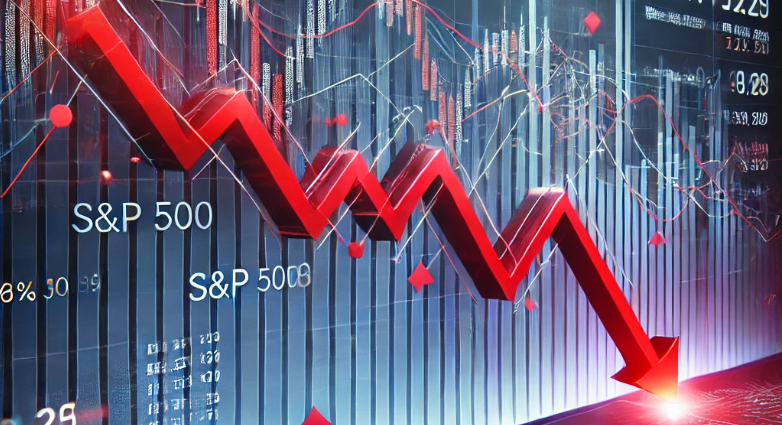The global financial markets have been experiencing significant volatility, leading many investors to ask, “Is the stock market crashing?” Recent events have certainly raised concerns, with major indices experiencing sharp declines. This article delves into the factors driving this downturn, offers strategies for protecting investments, and examines whether the current situation truly signals a market crash.
Understanding the Market Drop
Several factors have contributed to the recent market decline, prompting fears of a potential crash:
1. Weak Economic Data in the U.S.:
The U.S. labor market has shown signs of weakening, with the latest jobs report revealing higher unemployment rates and fewer jobs created than expected. This unexpected shift has fueled fears of a slowing economy, leading to a sell-off in stocks as investors seek safer assets (Investopedia) (markets.businessinsider.com).
2. Stagflation Concerns:
Economists are increasingly worried about the possibility of stagflation, a challenging economic environment characterized by high inflation and stagnant growth. This situation mirrors the economic troubles of the 1970s, raising concerns that a prolonged period of economic malaise could impact market performance (markets.businessinsider.com).
3. Disappointing Corporate Earnings:
Recent earnings reports from major corporations like Amazon, Intel, and Snap have fallen short of expectations. These disappointing results have led to significant stock price declines and have contributed to broader market volatility (Investopedia).
4. High Market Valuations:
Analysts have long warned that current market valuations are unsustainable. With many stocks trading at historically high price-to-earnings ratios, a correction may be underway as investors reassess the true value of their holdings (markets.businessinsider.com).
5. Federal Reserve’s Monetary Policy Challenges:
The Federal Reserve is facing pressure to cut interest rates in response to weakening economic indicators. However, with inflation still a concern, the Fed’s actions are being closely watched by investors. Market expectations for multiple rate cuts by the end of the year have added to the uncertainty (Investopedia) (markets.businessinsider.com).
6. Global Economic Uncertainties:
Geopolitical tensions and economic slowdowns in major economies like China and the European Union are contributing to a global sell-off. These international factors are exacerbating market instability as investors seek to mitigate risks (Investopedia).
Is the Stock Market Crashing? A Closer Look
While the recent downturn has been unsettling, it’s important to put the current situation into perspective:
- U.S. Markets: The Dow Jones Industrial Average, S&P 500, and Nasdaq have all experienced significant declines. Tech stocks, in particular, have been hard hit due to disappointing earnings and high valuations (Investopedia) (markets.businessinsider.com).
- Global Markets: International indices, including the FTSE 100, Nikkei 225, and Hang Seng, have also faced notable declines. This reflects a global loss of confidence as investors react to economic uncertainties (Investopedia).
Strategies for Protecting Investments
In light of the current market volatility, investors should consider the following strategies to protect their portfolios:
1. Reassess Risk Tolerance:
Evaluate your risk tolerance and adjust your investment strategy accordingly. If you’re uncomfortable with market volatility, consider reducing exposure to high-risk assets and shifting toward more conservative investments (Investopedia) (markets.businessinsider.com).
2. Focus on Quality Investments:
Invest in blue-chip stocks known for stability and strong financials. Consider dividend-paying stocks, which can provide a steady income stream during market turbulence (Investopedia) (markets.businessinsider.com).
3. Utilize Defensive Sectors:
Defensive sectors such as healthcare, utilities, and consumer staples often perform well during economic downturns. Additionally, consider investing in Treasury Inflation-Protected Securities (TIPS) to hedge against inflation (Investopedia).
4. Increase Cash Holdings:
Building a cash reserve can provide flexibility and the opportunity to buy undervalued assets once the market stabilizes. Evaluate your short-term liquidity needs to ensure you have enough cash on hand (markets.businessinsider.com).
5. Use Hedging Strategies:
Consider using protective puts or exploring alternative investments like gold and commodities, which can act as a hedge against market volatility (Investopedia) (markets.businessinsider.com).
6. Regular Portfolio Review:
Regularly review and rebalance your portfolio to ensure it aligns with your risk tolerance and investment goals. Staying informed about market trends and economic indicators can help you make informed decisions (Investopedia) (markets.businessinsider.com).
7. Seek Professional Guidance:
Consult financial advisors who can provide personalized strategies tailored to your financial situation and risk tolerance. Engaging in educational events and resources can also enhance your understanding of market dynamics (Investopedia) (markets.businessinsider.com).
Conclusion: Is the Stock Market Crashing?
While the recent market decline has been significant, it is not necessarily indicative of a full-blown crash. Market corrections are a normal part of the economic cycle, and proactive steps can be taken to protect investments. By staying informed, maintaining a long-term perspective, and adopting strategic measures, investors can navigate market volatility with confidence and resilience.





